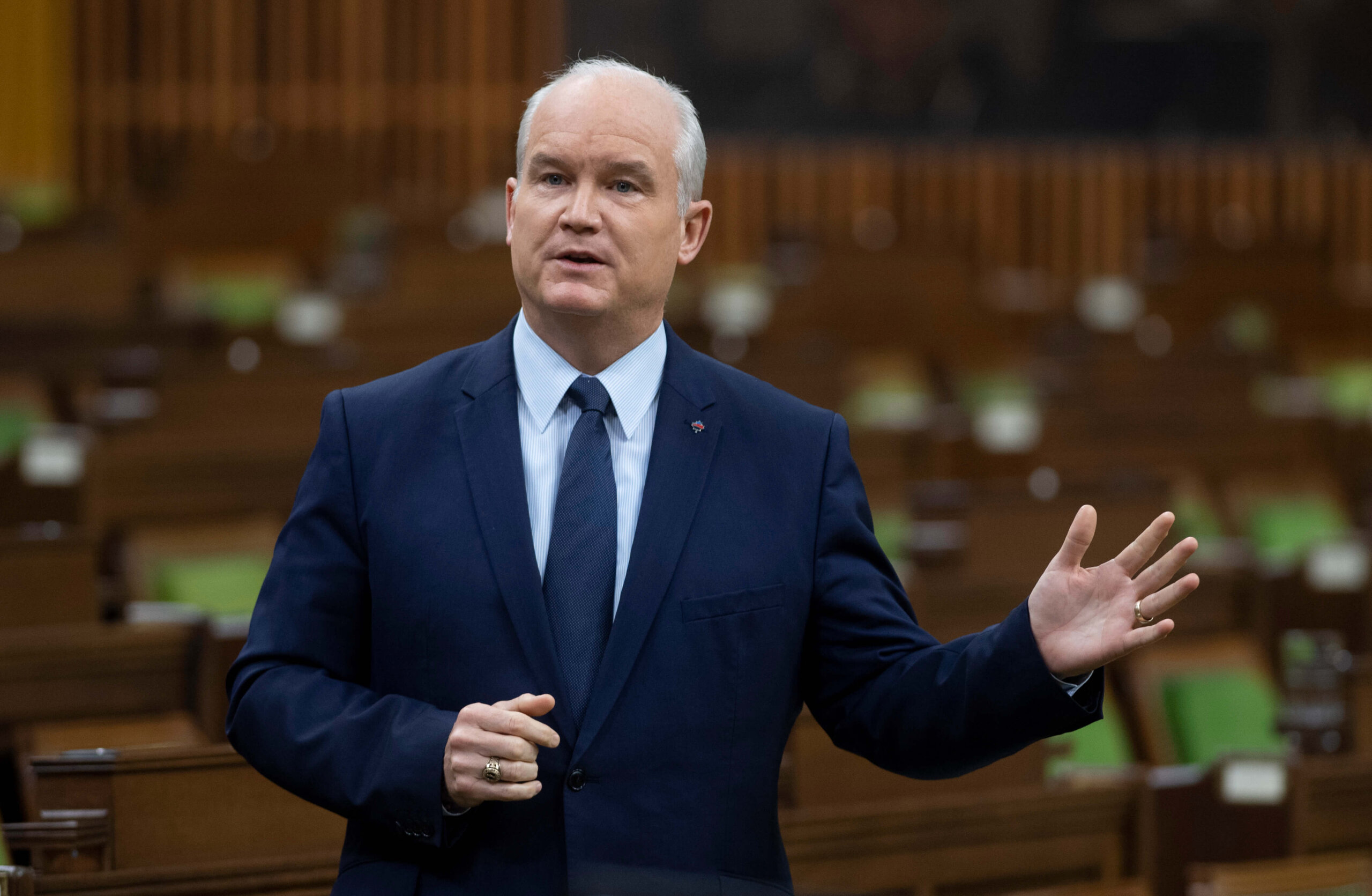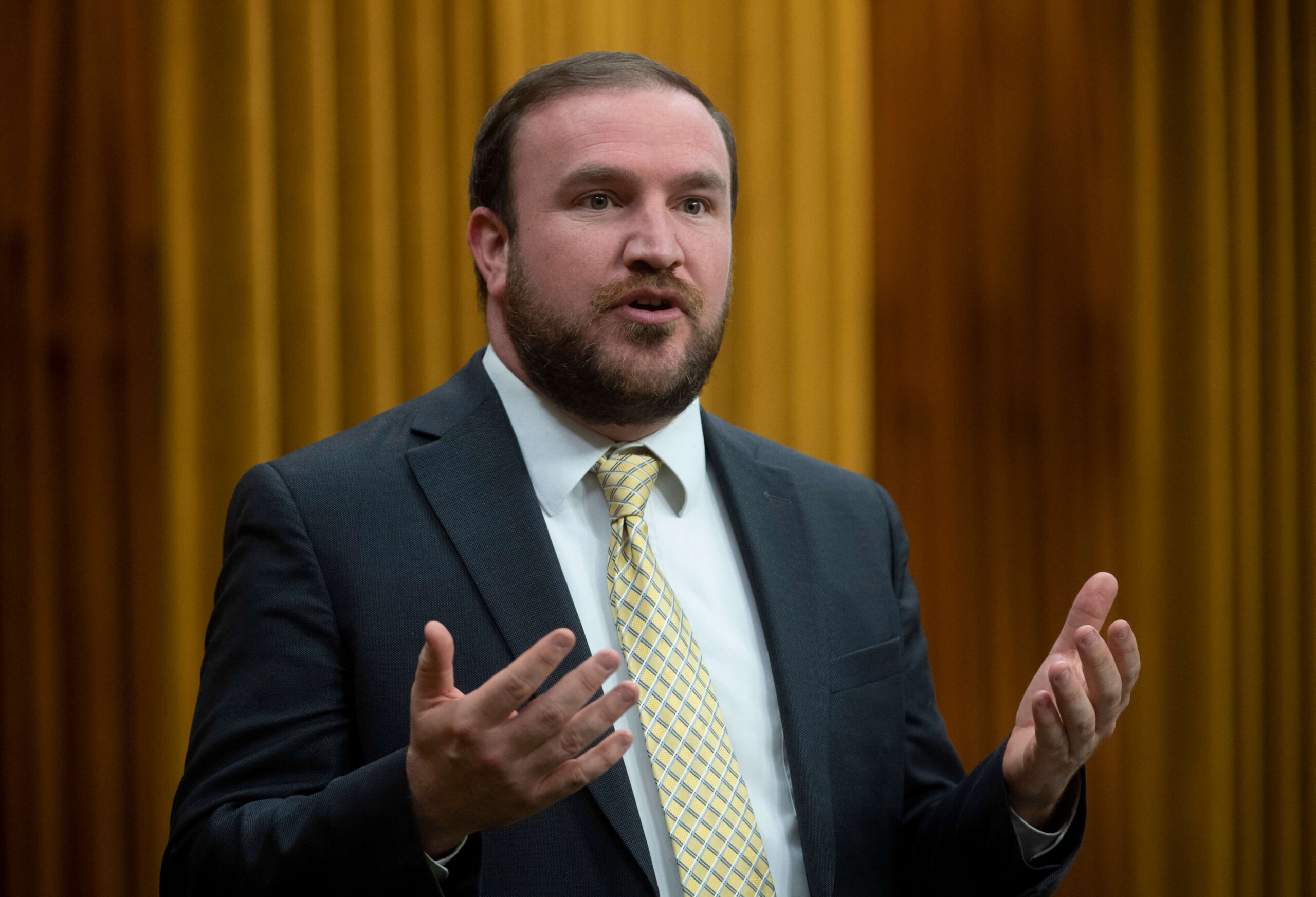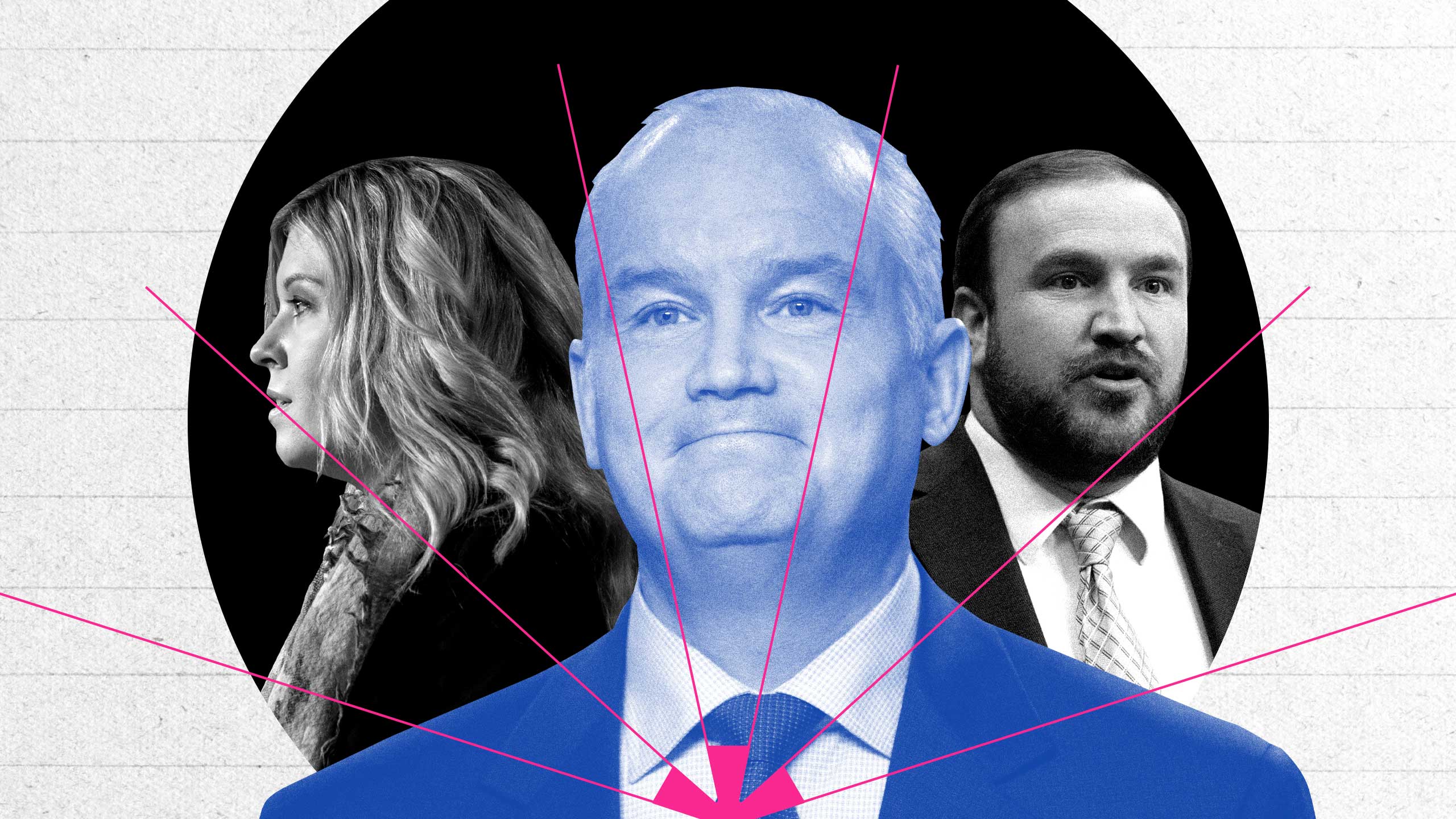On Mar. 19, conservative Canadians across the country logged onto Zoom to see their leader speak. For his first—and possibly only—policy convention as Official Leader of the Opposition, Erin O’Toole sought to unite a fractured party, a constituency splintered on social issues. Pacing the Ottawa stage in his signature navy suit, O’Toole laid out the challenge before them: Two lost elections in five and a half years, four leaders turned over in that time. The only way forward, he said, was to rebuild—not just by shifting policy positions, but by opening their doors to Canadians who may never have thought of the Conservative Party as home.
That, O’Toole stressed, had to include LGBTQ2S+ Canadians, a demographic his predecessor did much to put off. In 2019, former leader Andrew Scheer refused to comment on his personal beliefs around same-sex marriage, in what many political analysts deemed a massive misstep. Running to replace Scheer in 2020, O’Toole was quick to distinguish himself as an LGBTQ2S+ ally, citing his past voting record on a trans rights bill. And during his victory speech last summer, the new leader carefully chose his words: “You are an important part of Canada, and you have a home in the Conservative Party of Canada.”
On that policy convention stage in March, O’Toole talked about queer and trans communities again—this time in a call to action to save the party. “Whether you are LGBTQ or straight… You are welcome in our party,” he said. “In fact, we need your help. Canada needs your help. We are the party of this country’s founding and this country’s future.”
O’Toole will need LGBTQ2S+ communities and allies to win Canada’s next election—and not only because an anti-LGBTQ2S+ platform won’t fly with most Canadians. A 2020 poll from the Angus Reid Institute found that 70 percent Canadians say society should be more accepting of queer and trans people; that number is up from 64 percent in 2016. Recent research by Abacus Data’s David Coletto, meanwhile, finds that in order to secure more votes in an upcoming election than they did the last time around, the Conservatives need to appeal to a more diverse audience. And as former Conservative strategists argued in the Globe and Mail in 2019: “For the Conservative Party of Canada to be electorally relevant to the majority of Canadians, it should consider breaking from the past and look to a more contemporary conservatism that resonates more broadly across the country.”
“O’Toole will need LGBTQ2S+ communities and allies to win Canada’s next election.”
But doing so means contending with the party’s social conservative base—and if March’s policy convention is any indication, that base is not ready to let go of their stronghold on the party. Thanks in large part to the efforts of anti-LGBTQ2S+ organizations like Campaign Life Coalition, several top Conservatives lost their convention delegate races to social conservatives keen on bringing social issues like abortion or LGBTQ2S+ rights back to the table for debate. (The party, sensing the divide, barred those issues from being debated at the convention.)
As the Conservatives continue to prepare for Canadians to hit the polls, two sides of the big-tent party have emerged: A progressive conservative camp eager to modernize the party, and a social conservative demographic clinging to regressive social ideas. How the party comes together could determine the fate of LGBTQ2S+ conservatives—and the outcome of a looming federal election.
There’s a longstanding convention that queerness and conservatism don’t mix—so much so that some LGBTQ2S+ conservatives say it’s harder to come out as one in queer circles, rather than the other way around. The sentiment is rooted deep in the Conservative Party of Canada (CPC)’s history. The party, which formed in 2003 after the Progressive Conservative Party of Canada and the Canadian Alliance merged, has had a dismal track record on LGBTQ2S+ policies and issues. Its inaugural leader, former prime minister Stephen Harper, once called gay marriage “vile and disgusting,” a take he never rescinded in his 10-plus years as leader. During his tenure, Harper also teamed up with conservative evangelical Charles McVety to vote on reopening the marriage debate in 2006, a year after gay mariage was legalized nationally. It would take yet another decade for the party to update its internal documents to recognize marriage as a union between two consenting adults of any gender—a small, tardy gesture nevertheless considered a massive win by party progressives.
Harper’s successor, Andrew Scheer, also struggled on the issue of marriage equality, refusing to walk back comments he made in 2005 in opposition to same-sex marriage. Under Scheer’s leadership, the party welcomed a new cohort of anti-LGBTQ2S+ members: Derek Sloan, who later ran to replace Scheer, likened a proposed ban on conversion therapy to child abuse, while Richard Décarie, also a leadership hopeful, claimed being gay was a choice.
But ask a Conservative, and they’ll tell you queers have always been integral members of the party. Brayden Akers, a senior consultant with PR firm Navigator, suggests LGBTQ2S+ folks have been “overrepresented” behind the scenes in the CPC. Akers knows this firsthand: He’s gay himself, and has worked with Conservative governments over the past decade. “All members of our community have been involved in politics for a long time,” he says. “I don’t think we’ve had that problem of representation.”

Credit: The Canadian Press/Adrian Wyld
Several LGBTQ2S+ Conservatives have been behind some of the party’s most successful campaigns: Melissa Lantsman, once a powerhouse Conservative strategist and now the Conservative candidate in the Thornhill, Ontario, federal riding, worked in senior roles in each of the party’s national campaigns since 2008; Jamie Ellerton, now running his own PR firm Conaptus Limited, was also a Conservative senior staffer.
But this representation Akers speaks of—the senior staffers, the strategists, the confidants—has historically remained behind closed doors. When it comes to the forward-facing LGBTQ2S+ figure, the queer face of the party, the CPC has had little luck. Through election cycles, few out queer and trans candidates put their hat in the ring for the Conservatives; none ever won. While the country’s first openly gay MP, Vancouver NDP member Svend Robinson, came out publicly in 1988, it took more than 30 years for the CPC to welcome their own.
That candidate, Eric Duncan, would be found in an unlikely place: Not an urban centre with a Gay Village but the rural Ontario riding of Stormont–Dundas–South Glengarry. Duncan was one of just four self-identified LGBTQ2S+ candidates running for the Conservative Party in the last election; the remaining three candidates each finished in fourth place or lower in their respective races. But in October 2019, the 33-year-old was elected, becoming the de facto face of queer rights for the Conservatives.
Last November, as the pandemic rode another wave and Question Period ran in circles around health care measures, Duncan asked Minister of Health Patty Hajdu a pointed question: “Would you take my blood?”
In an eight-minute exchange, the members confronted one of the queer community’s most pressing of policy issues: The end of Canada’s long-standing blood ban, which prevents queer men and some trans women from donating blood if they have sex with men. Justin Trudeau’s Liberal Party promised to end the ban when elected in 2015. In that time, the Liberals managed to reduce deferral periods—the months of abstinence required to donate—but so far, the ban remains. And in the midst of a public health crisis, as Canadian Blood Services and Héma-Québec called for more donations, Duncan felt incensed.
The issue is a personal one for Duncan. As a teen, he was excited to donate blood for the first time with his family, only to realize his sexual orientation left him ineligible. Not yet out to his family, Duncan discreetly informed the donation clinic of his predicament; he still gave his blood, knowing full well it would end up in the garbage after he left.
No progress has been made on the blood ban since that Question Period exchange. But Duncan has pressed on, speaking in the House again in April about his own experience at the blood bank and prodding the Liberal government to make a change. It’s a tactic Duncan is uniquely positioned to execute for the Tories—an opportunity to speak from the community, for the community. That also takes some getting used to: Duncan jokes that he’s talked about his sexuality more in the past two years than ever before in his life. “I’ve reluctantly embraced it,” he says. “It was never a focal point for me until I got to Ottawa.” Still, he adds, he’s always had a place in the party. “I’ve been very welcomed as a candidate in general for my experience,” he says, “but I also feel the party has been happy that we have more diversity that way as well.”

Credit: The Canadian Press/Adrian Wyld
When he did arrive on the Hill, Duncan found an ally in Calgary–Nose Hill MP and health critic Michelle Rempel Garner, a longtime Conservative cheerleader for LGBTQ2S+ people. (Google her name and you’ll find a photo of her actually cheering, fists pumped in the air, at the 2016 Conservative policy convention after the party enshrined marriage equality in its internal documents.) In her decade as an MP, Rempel Garner has been vocal about LGBTQ2S+ issues: When social conservatives Richard Décarie and Derek Sloan ran for the party leadership in 2020, Rempel Garner tweeted that she would not “serve under someone whose leadership pitch is that someone’s sexuality is something to be ‘fixed.’ I am full on tired of this type of shit defining the conservative movement in Canada.” She’s also spoken up about sexual violence against LGBTQ2S+ people, conversion therapy and the blood ban. Her advocacy stems from a personal connection: Her closest friends are gay, as are many of her staffers.
But Duncan and Rempel Garner’s efforts demand a supportive leader behind them—someone who can unite the party on big issues. As Scheer’s successor, O’Toole has “changed the tone and tenor of the party,” Rempel Garner says. But she isn’t naive: “Erin [has been] very clear that [we must] recognize there are equality issues within the community that our party has an obligation to address,” she says. “Do we need to build on that? Yes.” Rempel Garner points to numerous issues—from increased access to mental healthcare and trans healthcare to policy issues like the blood ban—that must be dealt with. “There are a lot of issues in the queer community writ large that I think need to be addressed with action,” she says. “How you show you mean something is through action.”
In the coming months—ahead of a soon-predicted federal election—O’Toole may have his first chance to do just that.
Banning conversion therapy in Canada has not been a straightforward process. In March 2019, openly queer NDP MP Sheri Benson presented Parliament with an 18,000-signature petition to end the discredited practice for minors in the country. While the Trudeau government campaigned on a promise to ban conversion therapy—denounced by the World Health Organization as an “unjustifiable practice”—they decided, once elected, not to consider the petition to make it law. That, they said, was for the provincial and territorial governments to figure out.
But then, in March 2020, the Liberals seemed to have a change of heart when they tabled their own conversion therapy bill, Bill C-8. The legislation was one of the most comprehensive in the world, criminalizing practitioners who sought to change a person’s sexual orientation or gender identity. After reaching a second reading in the House of Commons, it languished in legislative purgatory for months. By August, as the COVID-19 pandemic worsened, Prime Minister Trudeau decided to prorogue the government; the move, like calling an election, killed all tabled legislation that had yet to become law. LGBTQ2S+ communities anxiously awaiting the ban against conversion therapy would have to wait months longer. In October 2020, another bill was tabled in its stead when Parliament resumed. Bill C-6 is nearly identical to its predecessor, and has since passed through two readings in the House.
“Some of the Tories’ most ardent social conservatives are now echoing the idea that Bill C-6’s language is problematic.”
While the Liberals continued to play politics at the expense of the conversion therapy ban, the Conservatives found themselves in the midst of a leadership race. The competition for the top job is a precarious one: In a big-tent party, considerable efforts must be made not to alienate any one faction of the base. In a virtual campaign meeting with Quebec social conservatives in June 2020, O’Toole raised concerns about Bill C-8—particularly, how it would treat religious leaders who discuss matters of LGBTQ2S+ identity with their parishioners. “It’s very important to respect the conversation between a priest and the members of their flock,” he told supporters. Survivors of conversion therapy and experts, meanwhile, say the practice is often veiled as innocuous conversations about faith and call proposed amendments to the conversion therapy ban “red herrings.”
That same month, a recording from the virtual meeting was leaked to Radio-Canada. His campaign was quick to clarify the leadership hopeful’s stance: It’s not that O’Toole is against the ban; he just takes issue with how the bill has been drafted. O’Toole himself chose not to comment to the media but to instead tweet, in French only, that “conversion therapies do not have a place in Canada and should be abolished.” (O’Toole’s team did not respond to Xtra’s request for an interview.)
Some of the Tories’ most ardent social conservatives are now echoing the idea that Bill C-6’s language is problematic. Sloan used the bill as an opportunity to fundraise, calling on his supporters to donate so that he might be able to fight the legislation from the inside. (Sloan has since been booted from the Conservative caucus after accepting a donation from a white nationalist.) Alberta MP Garnett Genuis—the CPC’s shadow minister for human rights—says Bill C-6 “uses an overbroad and ultimately false definition of conversion therapy,” and that any consenting person seeking “professional and religious counselling” around their sexual orientation and gender identity should not be criminalized. Genuis has since launched a campaign called “Fix The Definition” to petition changes to the legislation. Ontario MP Jamie Schmale came under fire from LGBTQ2S+ activists and allies after asking his constituents how he should vote on Bill C-6. “The issue isn’t whether conversion therapy ought to be unlawful, but rather whether certain kinds of advocacy should actually be criminalized,” Schmale told a local magazine. And during debate, B.C. MP Tamara Jansen advocated in support of conversion therapy, telling the story of a young woman who utilized the practice to help her abstain from “lesbian activity.”
On LGBTQ2S+ issues, what remains is a party divided—and O’Toole is staying camped out in the middle. He still stands behind his calls for amendments to the conversion therapy bill. Rempel Garner says the debate around the bill has been fruitful, while Duncan believes the suggestions are being made in good faith and supports the amendments O’Toole has called for. But how O’Toole’s views on Bill C-6 are perceived by LGBTQ2S+ Canadians could be a tipping point: The bill will be the first LGBTQ2S+-specific legislation in O’Toole’s time as leader to pass through the House, over a practice that has affected at least 47,000 queer and trans Canadians. Thus far, Conservatives are the only MPs to have voted against the bill, in what should be a straightforward call to end a discredited and harmful practice. How Conservatives vote for Bill C-6—still in the midst of its third reading—will be of imminent concern to the very LGBTQ2S+ people O’Toole wants to join the party. Because, as Rempel Garner notes, words don’t mean much without action.
In many ways, O’Toole’s predicament is not unusual. South of the border, any notion of a moderate right-winger all but disappeared under Donald Trump. The queer Republican became even more endangered as Trump escalated his attacks against trans rights and freedoms and protections for LGBTQ2S+ people. And even with Trump’s exit from the Oval Office, the party remains tied to evangelical Christianity and its brand of anti-queer, anti-trans values that discourages LGBTQ2S+ Americans from supporting the Republican movement.
But an open and welcoming Conservative Party is not an impossible feat—O’Toole just has to look across the pond. The U.K.’s Conservative Party boasts far more openly LGBTQ2S+ elected members than its Canadian counterpart; 25 of 364 Conservative MPs identify as LGBTQ2S+.
Andrew Reynolds, a senior research scholar at Princeton University who studies LGBTQ politics, credits former prime minister David Cameron for this inclusivity. In 2010, Cameron made concerted efforts to shift the tone of the British Conservative Party: He would no longer tolerate anti-LGBTQ2S+ sentiment within the party, and he recruited more diverse candidates who identified as queer. In doing so, Reynolds says, Cameron neutralized LGBTQ2S+ issues: If all parties mutually agreed on equality, queer and trans legislation could no longer be positioned as fodder for electoral gain.
“To find the same level of success as Cameron did in the U.K., O’Toole must make greater commitments to LGBTQ2S+ issues.”
It’s a direction O’Toole could take himself. But to find the same level of success as Cameron did in the U.K., he must make greater commitments to LGBTQ2S+ issues. Reynolds lays out a simple three-pronged approach for O’Toole: First, he must work to undo the legislative inequalities—like conversion therapy—that still exist for Canadians. Then, he must form a diverse and inclusive leadership team. “Eric Duncan is not enough,” Reynolds says. And lastly, he must foster a more inclusive culture among Canadians—calling for, say, LGBTQ2S+-inclusive education across the country so that anti-queer and anti-trans sentiments are quashed at a young age.
Reynolds says it’s surprising that Canada’s Conservatives have yet to evolve on LGBTQ2S+ issues the same way the Brits have. Conservatives who spoke to Xtra for this story shrug this off; they say the CPC is moving at the same pace as Canadians on queer acceptance. But Reynolds—and numerous research studies—suggest otherwise: A majority of the country accepts and embraces queer and trans rights, and the CPC has yet to catch up.
The reality is that the CPC is only as progressive on LGBTQ2S+ issues as its most socially conservative members. The party lags on queer inclusivity because a number of Conservative MPs still hold anti-queer and anti-trans beliefs. Until those members change their tune—or else leave the party—the CPC cannot neutralize LGBTQ2S+ issues the way British Conservatives did nearly a decade ago. The party can’t be a more welcoming place for LGBTQ2S+ Canadians. And O’Toole won’t just remain out of step with Canadian society—he’ll remain out of 24 Sussex Drive, as well.
Update: April 28, 2021 12:43 pmThis story has been updated to include the latest figures of those affected by conversion therapy in Canada.


 Why you can trust Xtra
Why you can trust Xtra


